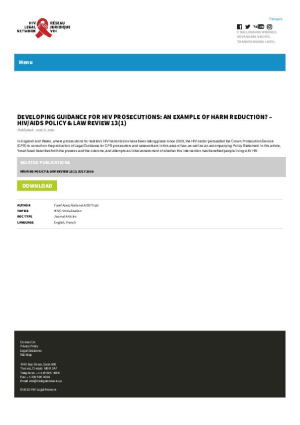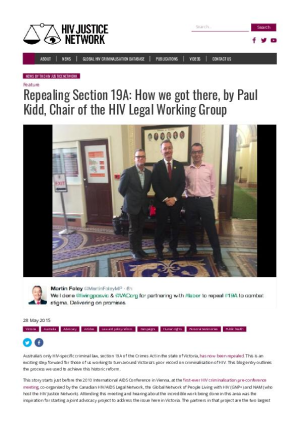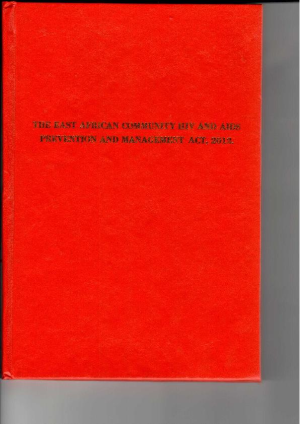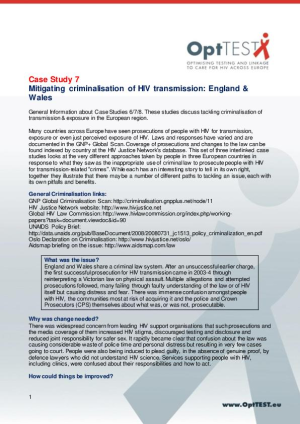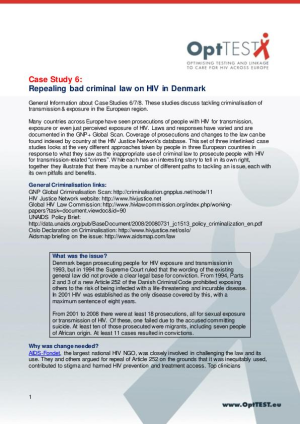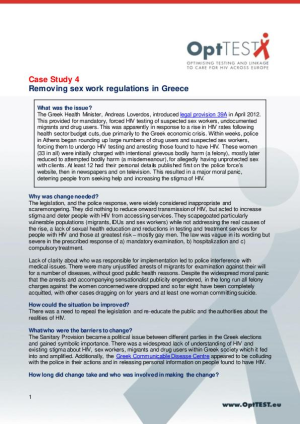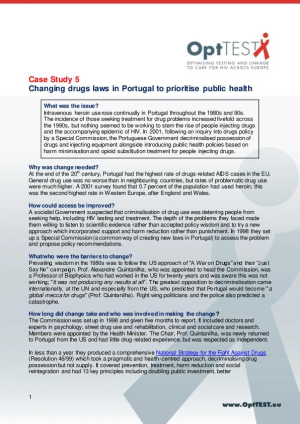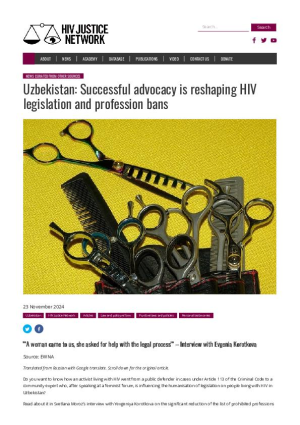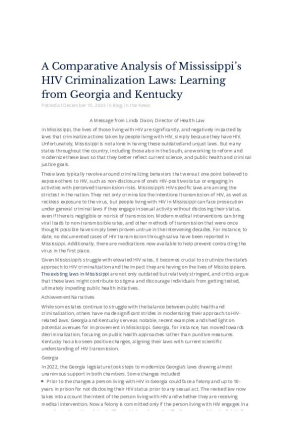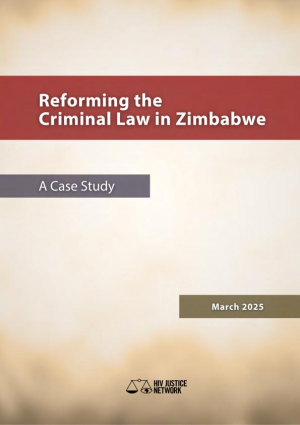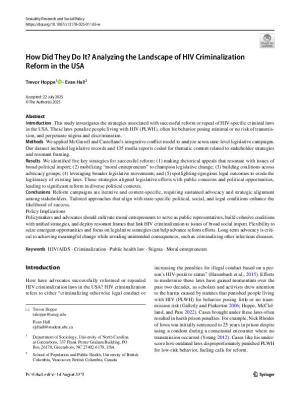Describes both the process and the outcome of community lobbying the Crown Prosecution Service to develop guidance for prosecutors on HIV cases, and whether this intervention has benefited people living with HIV.
Advocacy and activism
Advocacy success stories
Doing HIV Justice: Clarifying criminal law and policy through prosecutorial guidance
Demystifies how civil society worked with the Crown Prosecution Service of England & Wales to create the world’s first policy and guidance for prosecuting the reckless or intentional transmission of sexual infection.
Interview with Iowa’s Tami Haught on Building a Broad Law Reform Coalition
Provides first-hand account of advocacy to reform Iowa's HIV criminalization statute, Iowa Code 709C.
Repealing Section 19A: How we got there
Provides first-hand account of advocacy to reform Victoria’s (Australia) Crimes Act.
The East African Legislative Assembly passes the EAC HIV & AIDS Prevention and Management Bill
April 2012 passing of the HIV & AIDS Prevention bill by the East African Legislative Assembly (Tanzania, Kenya, Uganda, Rwanda and Burundi). The bill offers a constructive alternative to the N’Djamena Model Laws promoting HIV criminalisation. The Bill followed strong actions by civil society including numerous stakeholder meetings of civil society and politicians.
How to change the law
Ground-breaking research from the Human Dignity Trust offering a step-by-step analysis of how the reform of discriminatory sexual offence laws has been achieved and identifying how it can be replicated. Countains a series of reports investigating in detail how countries in four regions of the world have recently reformed outdated and discriminatory sexual offences laws.
Mitigating criminalisation of HIV transmission: England & Wales
Many countries across Europe have seen prosecutions of people with HIV for transmission, exposure or even just perceived exposure of HIV. Laws and responses have varied. This case study looks at approaches taken by people in England & Wales in response to what they saw as the inappropriate use of criminal law to prosecute people with HIV for transmission-related “crimes”.
OptTEST case study 6: Repealing bad criminal law on HIV in Denmark.
This study looks at how Denmark tackled criminalisation of transmission & exposure.
OptTEST case study 8: Criminalisation law reform in the Netherlands
This study looks at how The Netherlands tackled criminalisation of transmission & exposure.
OptTEST case study 4: Removing sex work regulations in Greece
In April 2012, the Greek police carried out a massive operation in downtown Athens, arresting drug users and sex workers, forcing them to undergo HIV testing and charging them with prostitution. This case study explores the response from human rights and HIV groups both in Greece and internationally and the following campaign to repeal the provision.
OptTest case study 5: Changing drugs laws in Portugal to prioritise public health
Presents the challenges followed by Portugal to address the increase in drug consumption throughout the 1980s and 90s. Explains the decriminalization and harm reduction strategy, along with lessons learnt.
The ABC’s of HIV law reform in Latin America and the Caribbean
We interviewed key players in the Latin American and the Caribbean region to understand what led to law reform in three countries between 2019 and 2023: Argentina (2022), Belize (2023) and Colombia (2019). While the process in each country was, and always is, a product of factors unique to the local context and cannot be replicated exactly, lessons can be drawn from these case studies that are likely to be relevant to other countries.
“‘A woman came to us, she asked for help with the legal process’” – Interview with Evgenia Korotkova
Interview exploring how an activist living with HIV went from a public defender in cases under Article 113 of the Criminal Code to a community expert who, after speaking at a feminist forum, is influencing the humanisation of legislation on people living with HIV in Uzbekistan. Svetlana Moroz’s interview with Yevgeniya Korotkova on the significant reduction of the list of prohibited professions for people living with HIV in Uzbekistan.
A Comparative Analysis of Mississippi’s HIV Criminalization Laws: Learning from Georgia and Kentucky
While some states continue to struggle with the balance between public health and criminalization, others have made significant strides in modernizing their approach to HIV-related laws. Georgia and Kentucky serve as notable, recent examples and shed light on potential avenues for improvement in Mississippi. Georgia, for instance, has moved towards decriminalization, focusing on public health approaches rather than punitive measures. Kentucky has also seen positive changes, aligning their laws with current scientific understanding of HIV transmission.
Breastfeeding and HIV: An example of what stigma, discrimination and lack of information can cause.
This video reflects the story of a woman from Argentina who was prosecuted for wanting to breastfeed her baby and in the success of the defense of her rights with the accompaniment of ICW Argentina so that she could comply with the reproductive right of breastfeeding.
Reforming the criminal law in Zimbabwe: A case study
The report, Reforming the Criminal Law in Zimbabwe: A Case Study, explores how advocates, legal experts, and community leaders worked together to repeal Section 79 of Zimbabwe’s Criminal Code, which criminalised HIV non-disclosure, exposure, or transmission. It outlines key strategies used in the campaign and lessons for other countries seeking to end HIV criminalisation.
“It is time!” – How Zimbabwe decriminalised HIV
This video explores how advocates, legal experts, and community leaders worked together to repeal Section 79 of Zimbabwe’s Criminal Code, which criminalised HIV non-disclosure, exposure, or transmission. It outlines key strategies used in the campaign and lessons for other countries seeking to end HIV criminalisation. It also shows how advocates responded when a new law threatened to reintroduce HIV criminalisation.
How Did They Do It? Analyzing the Landscape of HIV Criminalization Reform in the USA
This study investigates the strategies associated with successful reform or repeal of HIV-specific criminal laws in the USA.

